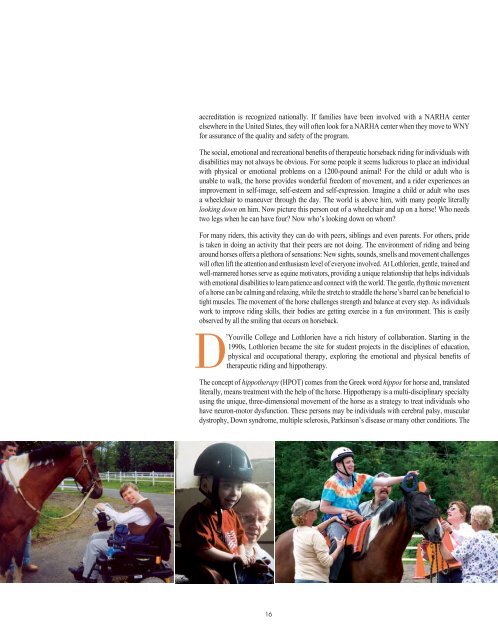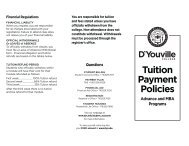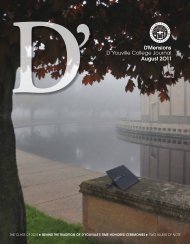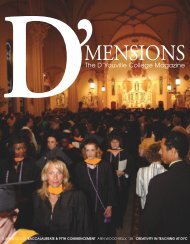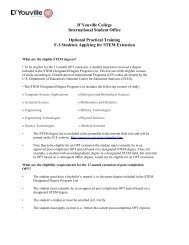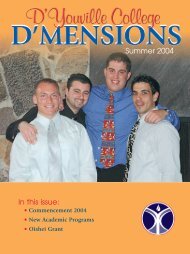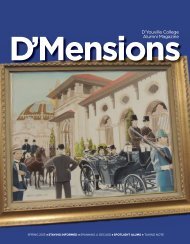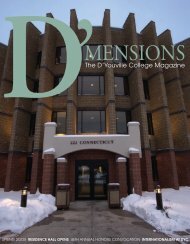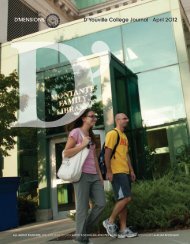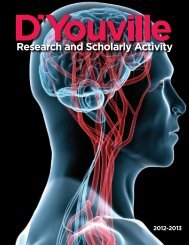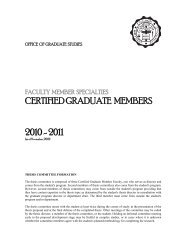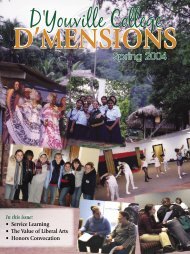d'mensions the d'youville college Journal summer 2oo7
d'mensions the d'youville college Journal summer 2oo7
d'mensions the d'youville college Journal summer 2oo7
- No tags were found...
You also want an ePaper? Increase the reach of your titles
YUMPU automatically turns print PDFs into web optimized ePapers that Google loves.
accreditation is recognized nationally. If families have been involved with a NARHA centerelsewhere in <strong>the</strong> United States, <strong>the</strong>y will often look for a NARHA center when <strong>the</strong>y move to WNYfor assurance of <strong>the</strong> quality and safety of <strong>the</strong> program.The social, emotional and recreational benefits of <strong>the</strong>rapeutic horseback riding for individuals withdisabilities may not always be obvious. For some people it seems ludicrous to place an individualwith physical or emotional problems on a 1200-pound animal! For <strong>the</strong> child or adult who isunable to walk, <strong>the</strong> horse provides wonderful freedom of movement, and a rider experiences animprovement in self-image, self-esteem and self-expression. Imagine a child or adult who usesa wheelchair to maneuver through <strong>the</strong> day. The world is above him, with many people literallylooking down on him. Now picture this person out of a wheelchair and up on a horse! Who needstwo legs when he can have four? Now who’s looking down on whom?For many riders, this activity <strong>the</strong>y can do with peers, siblings and even parents. For o<strong>the</strong>rs, prideis taken in doing an activity that <strong>the</strong>ir peers are not doing. The environment of riding and beingaround horses offers a plethora of sensations: New sights, sounds, smells and movement challengeswill often lift <strong>the</strong> attention and enthusiasm level of everyone involved. At Lothlorien, gentle, trained andwell-mannered horses serve as equine motivators, providing a unique relationship that helps individualswith emotional disabilities to learn patience and connect with <strong>the</strong> world. The gentle, rhythmic movementof a horse can be calming and relaxing, while <strong>the</strong> stretch to straddle <strong>the</strong> horse’s barrel can be beneficial totight muscles. The movement of <strong>the</strong> horse challenges strength and balance at every step. As individualswork to improve riding skills, <strong>the</strong>ir bodies are getting exercise in a fun environment. This is easilyobserved by all <strong>the</strong> smiling that occurs on horseback.’Youville College and Lothlorien have a rich history of collaboration. Starting in <strong>the</strong>1990s, Lothlorien became <strong>the</strong> site for student projects in <strong>the</strong> disciplines of education,physical and occupational <strong>the</strong>rapy, exploring <strong>the</strong> emotional and physical benefits of<strong>the</strong>rapeutic riding and hippo<strong>the</strong>rapy.The concept of hippo<strong>the</strong>rapy (HPOT) comes from <strong>the</strong> Greek word hippos for horse and, translatedliterally, means treatment with <strong>the</strong> help of <strong>the</strong> horse. Hippo<strong>the</strong>rapy is a multi-disciplinary specialtyusing <strong>the</strong> unique, three-dimensional movement of <strong>the</strong> horse as a strategy to treat individuals whohave neuron-motor dysfunction. These persons may be individuals with cerebral palsy, musculardystrophy, Down syndrome, multiple sclerosis, Parkinson’s disease or many o<strong>the</strong>r conditions. The16


